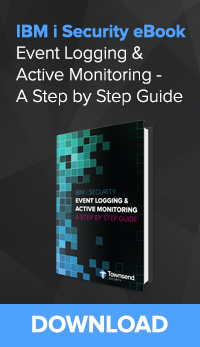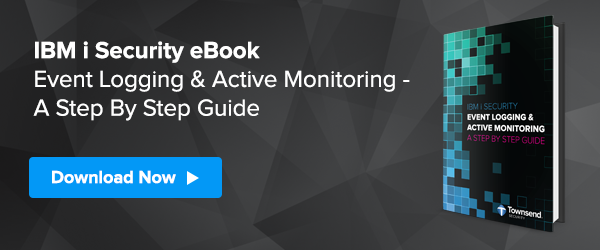Excerpt from the eBook "IBM i Security: Event Logging & Active Monitoring - A Step By Step Guide."
 Active monitoring (sometimes referred to as Continuous Monitoring) is a critical security control for all organizations. And it is one of the most effective security controls you can deploy. The large majority of security breaches occur on systems that have been compromised days, weeks, or even months before sensitive data is lost. A recent Verizon Data Breach Investigations Report1 indicates that a full 84 percent of all breaches were detected in system logs. This is why the Center for Internet Security includes active monitoring as a Critical Security Control (Control number 6).
Active monitoring (sometimes referred to as Continuous Monitoring) is a critical security control for all organizations. And it is one of the most effective security controls you can deploy. The large majority of security breaches occur on systems that have been compromised days, weeks, or even months before sensitive data is lost. A recent Verizon Data Breach Investigations Report1 indicates that a full 84 percent of all breaches were detected in system logs. This is why the Center for Internet Security includes active monitoring as a Critical Security Control (Control number 6).
There are several elements of a truly effective Active Monitoring strategy:
Central Collection and Repository of All Events
Attackers almost never start with your core IBM i server directly. They attack a web application or infect a user PC and work their way into the IBM i server. A defensible active monitoring strategy has to collect events from across the entire organization. By the time they show up on your IBM i server they have probably compromised a number of intermediate systems and an opportunity to prevent the breach has been missed. Collect all events across your entire IT infrastructure to gain the best early detection opportunities.
Real Time Event Collection
Data breaches are happening much faster than in the past. In some cases the loss of data happens just minutes after the initial breach. This means that you must collect security events in real time. Good active monitoring solutions are able to digest threat information
in real time and give you the chance to deter them. Avoid batch event collection – you can collect IBM i security audit journal information in real time and you should.
Event Correlation
Event correlation is key to an effect active monitoring solution. This is typically accomplished through the use of special software implemented in Security Information and Event Management (SIEM) solutions. Highly automated SIEM solutions have the ability to correlate events across a large number of systems and automatically identify potential problems. They do exactly what we want computer systems to do – handle large amounts of data and apply intelligent interpretation of the data.
Anomaly Detection
Anomaly detection is another aspect of active monitoring. That unusual system login at 3:00am on a Sunday morning would probably escape the attention of our human IT team members, but good active monitoring solutions can see that anomalous event and report on it.
Alerting and Resolution Management
When a problem is discovered we need to know about it as soon as possible. A good active monitoring solution will inform us through a variety of alerting channels. Emails, text, dashboards and other mechanisms can be deployed to bring attention to the problem - and we need to be able to track the resolution of the event! We are all processing too much information and it is easy to forget or misplace a problem.
Forensic Tools
Forensic tools are critical to an active monitoring solution as they enable the rapid analysis of an attacker’s footprints in our system. The key tool is an effective and easy-to-use query application. Log data can include millions of events and be impossible to inspect without a good query tool. The ability to save queries and use them at a later time should also be a core feature of your forensic toolset.

